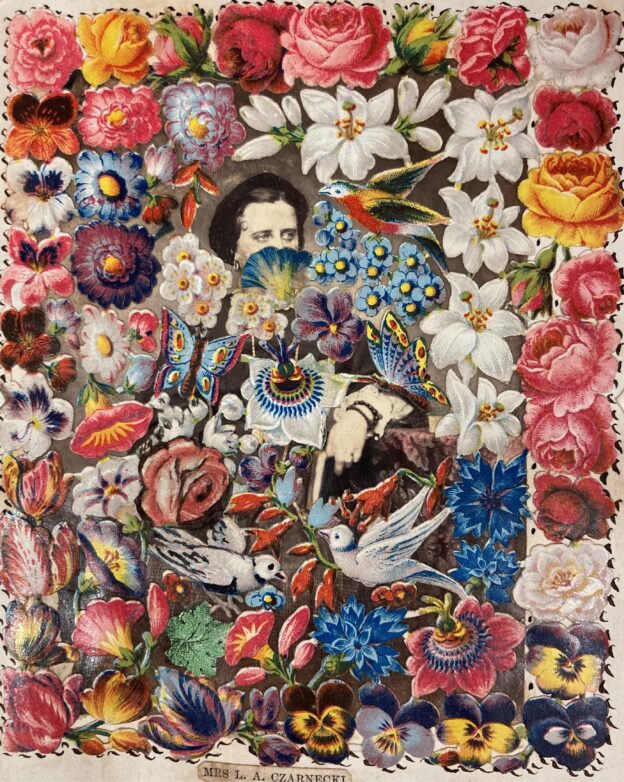Today we are publishing a blog by Ash Mowat, a volunteer in the Civic Engagement Team, on a little known 19th-century Scottish poet. The Edinburgh-born Louisa Agnes Czarnecki (née Winter) was a versatile, politically engaged writer married to a Polish political exile.
In this blog I shall comment on the Poetry Album of Louisa Agnes Czarnecki (Coll-2090) held in Edinburgh University Library’s Heritage Collections.
Louisa Agnes Czarnecki (1823-1877) was a 19th-century Scottish poet whose published works include General Bem and Other Poems (1852) and The Hero of Italy and Other poems (1864). Her work often featured political figures and subjects such as the Polish general and freedom fighter Józef Bem (1794-1850), and Giuseppe Garibaldi (1807-1882), the Italian revolutionary renowned for his contribution to the unification of Italy. Czarnecki was married to a Polish exile who had left his native country in the wake of its annexation by the Russian Empire.
At the University Library, I viewed the poetry album of Louisa Agnes Czarnecki dated 1861. This is a large leather-bound album such as used to display photographs, and has multi-coloured pages with examples of Czarnecki’s poems from printed texts attached, together with many photographs and artistic images.
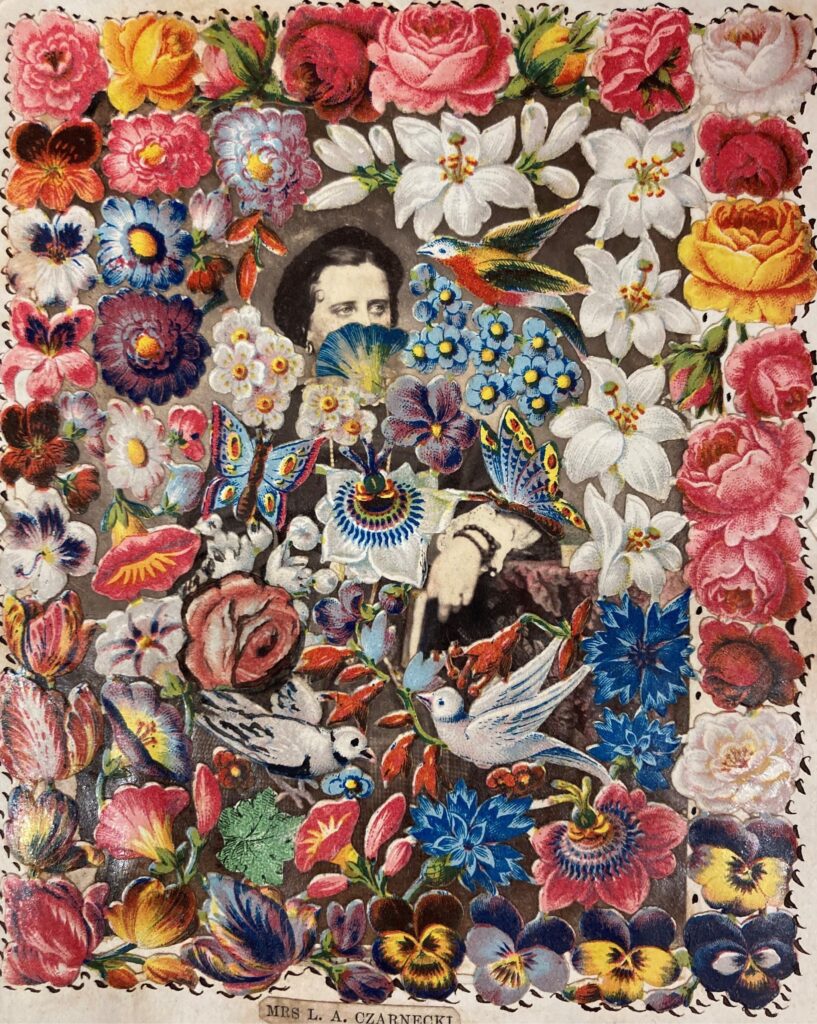
A florally-decorated photograph of the poet
The poem, ‘Poland Shall Exist Again’ is a fine demonstration of Czarnecki’s passionate political verse. It is a rousing call for justice and freedom for the land and people of Poland, suffering under the violent actions of the Russian Empire. In the poem she refers to an earlier hero of Poland, Tadeusz Kościuszko (1746-1817), as an empowering example of the country’s previous triumphs against oppression.
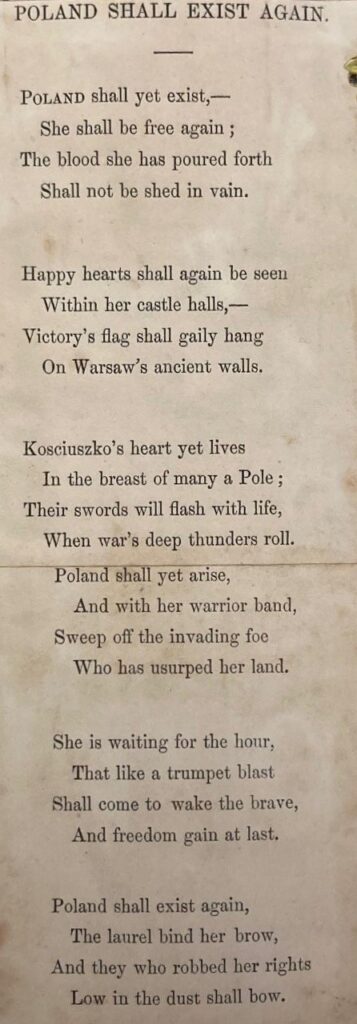
‘Poland Shall Exist Again’
The poem takes the form of a quatrain of six stanzas of four lines, with the second and fourth lines in rhyming format. As effective as it is on the written page, it lends itself best to being read aloud, in that it is an imploring cry for justice and freedom designed to provoke righteous anger at the abuses inflicted upon Poland, with a rallying call for the nation’s emancipation. It could almost be seen to anticipate the January Uprising of 1863.
In the next poem, Czarnecki chooses as her subject not a figure from politics, but the pioneering figure of the Scottish obstetrician, Sir James Young Simpson (1811-1870), Professor of Midwifery at the University of Edinburgh. Simpson excelled in the much-needed development of anaesthetics to address the appalling pain experienced by women giving birth and patients undergoing surgery. To advance his research, he and his colleagues took great personal risks in experimenting on themselves with varying agents, finally settling on chloroform as the most effective and least hazardous anaesthetic. After Queen Victoria used chloroform during childbirth in 1853 it became more widely used. Simpson became the first individual to receive a knighthood for services to medicine in 1866.
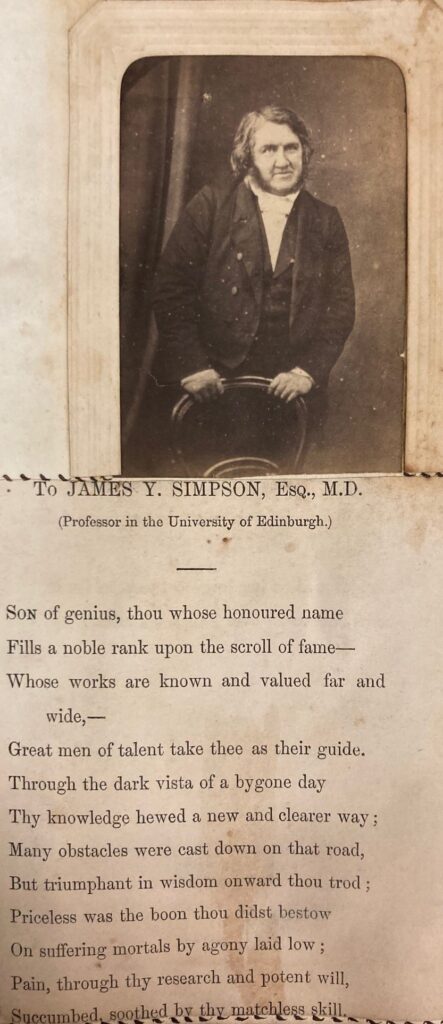
A poem in honour of Sir James Young Simpson, with a photograph of the scientist.
The style employed in the poem is more reflective and endearing in describing the value and import of Simpson’s contribution to the alleviation of pain for so many.
‘Priceless was the boon thou didst bestow
On suffering mortals by agony laid low;
Pain, through thy research and potent will,
Succumbed, soothed by thy matchless skill.’
This demonstrates the versatility of Czarnecki’s subject matter and tone of voice in her poems, and is a further example of her wish to celebrate the lives of those who have served to improve the lot of others.
As a further evidence of her versatility, Czarnecki also enjoys the subject of nature as a theme. One example is the poem ‘Verses to a River’. A short poem of three four-line stanzas, it manages to convey both the untameable powerful force of a river in flow, and to reflect on the rousing impact experienced by the observer witnessing it.
‘Rush on like a thunder-cloud,
Defying all control,
Like the blast of the trumpet loud,
Stirring up the hero’s soul.’
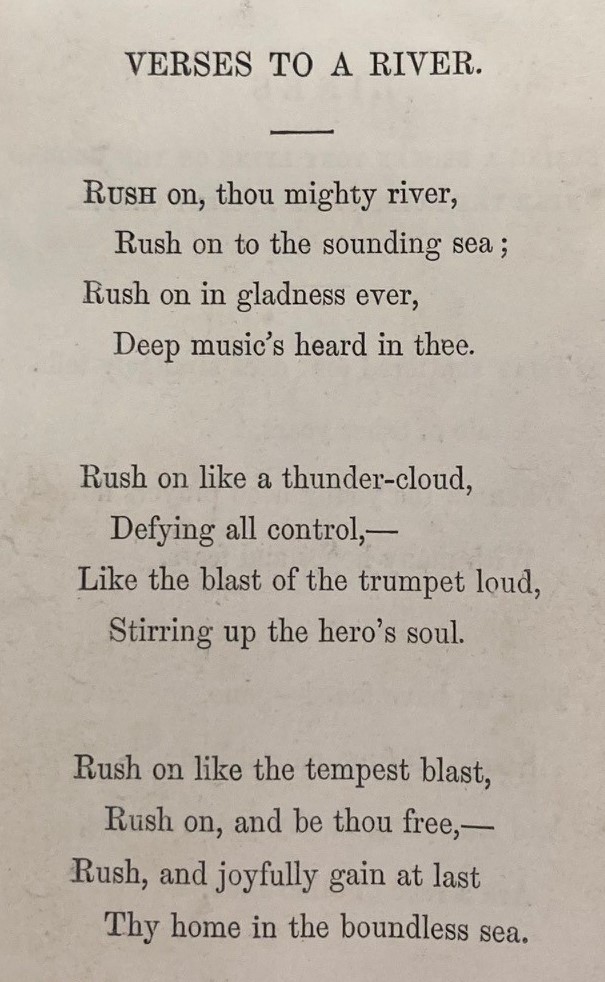
And in the poem entitled ‘On flowers’, she remarks how the vulnerability and short life of flowers mirrors our own mortality, and observes how they are used to bookmark events throughout life and upon our death.
‘Speaking things are flowers, on their fragile stem:
All bliss here is fleeting, like unto them.’
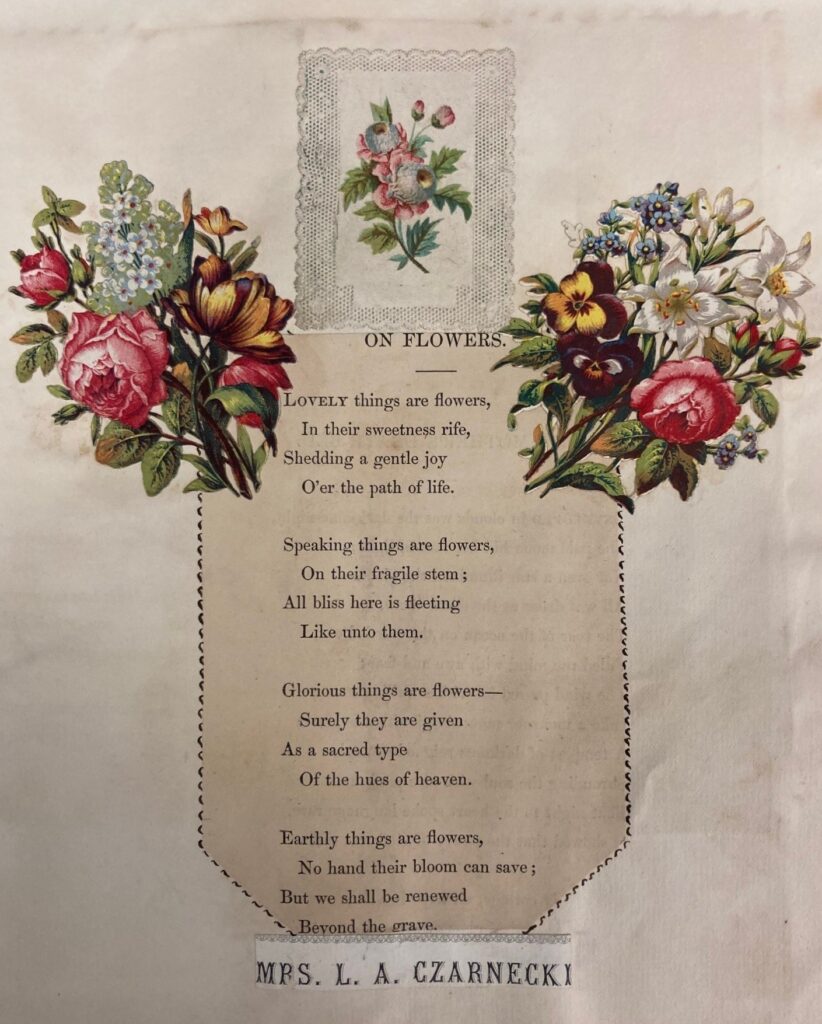
I noted with interest that included in the album were several of her poems published in The Freemasons Magazine from 1869. As women were not at this time permitted entry to freemasonry, she must have enjoyed a significant reputation for her poetry to be included in their publications.
In conclusion, I was impressed with the quality and diversity of Czarnecki as a poet, and the album is in beautiful condition for its age. Included with the poems themselves are equally well-crafted colourful images and decorations, showing clearly how lovingly this volume was created and maintained.
I should like to thank all staff at the University of Edinburgh Library Heritage Collections for the privileged to be allowed to view this precious item.
Biographical Note (by Paul Barnaby)
There is scant biographical available on L. A. Czarnecki and her husband. I have gathered the following brief details from online genealogical sources. I should particularly like to thank Jeanette Scott, a descendant of L. A. Czarnecki, for her assistance.
Louisa Agnes Czarnecki was born in Edinburgh as Agnes Louisa Winter on 8 November 1823. Her parents were Robert Winter, a jeweller and sometime coal merchant, and Jane Chalmers, a native of Kirkwall, Orkney. She was educated at David Foggo’s private day school for girls, where, in 1834, she was Dux of the Highest Class of Young Ladies. She married Arthur Antoine Alphonse Czarnecki in Edinburgh on 27 November 1849. Following her marriage, she worked as a private music teacher in Edinburgh, where she also published two volumes of poetry and three of musical compositions. Around 1866, she and her husband moved to London, where she died in September 1877. (She appears to have varied the order of her forenames throughout her life.)
Census details for Arthur Antoine Alphonse Czarnecki vary somewhat, but he appears to have been born in Poland at some point between 1814 and 1820. By the 1840s, however, his family were living in the Haute-Saône region of France. He arrived in Great Britain on 11 October 1848, having travelled from Belgium to Dover. The date of his arrival suggests that he may have returned to Poland to fight in the unsuccessful Polish uprising of 1848. Following his marriage to Agnes Louisa Winter, he worked as a French teacher in Edinburgh, then as a commercial traveller for the firm Mould & Tod, who printed his wife’s poetry. Following his move to London, he worked as an agent of commission. By this stage he was a naturalized British citizen. Following his wife’s death in 1877, he married Matilda Edith Binckes in 1878. He died and was buried in London in March 1893.
Louisa Agnes Czarnecki’s poetry album contains the following poem addressed to her husband, accompanied by a photograph of the couple:
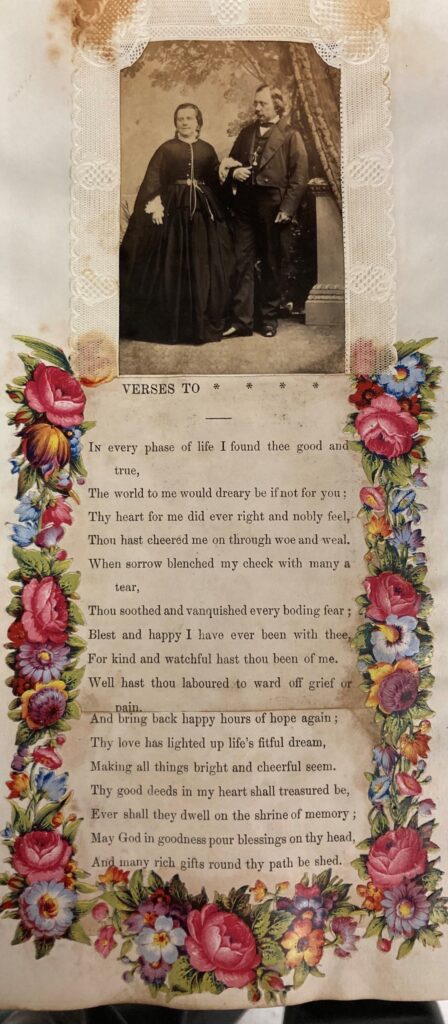
A poem addressed to Arthur Czarnecki, with a photograph of Louisa Agnes and Arthur.
